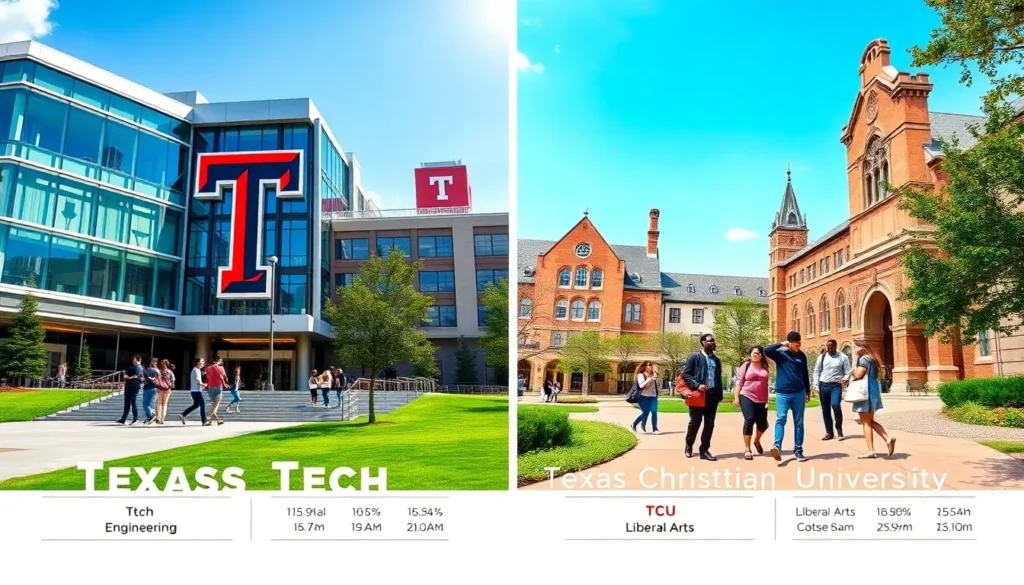When it comes to higher education in Texas, two names often rise to the top: Texas Tech University (Tech) and Texas Christian University (TCU). But how do they really stack up against each other? Imagine a showdown where academics, campus life, and post-graduation success are the main contenders. Who will claim the crown? In this comprehensive comparison, you’re about to find out just how these two institutions measure up. Grab your coffee, and let’s jump into the nitty-gritty details, no punchlines skipped.
Table of Contents
ToggleOverview of Tech and TCU

Institutional History and Background
Texas Tech was established in 1923, evolving into a comprehensive research university known for its strong engineering and agriculture programs. TCU, founded a bit earlier in 1873, is a private university that prides itself on its liberal arts curriculum and close-knit community. Both institutions bring unique histories to the table, making them stand out in their own right.
Academic Programs and Strengths
When discussing academics, Tech shines with robust programs in engineering, business, and health sciences. Their engineering school is particularly renowned, often producing graduates who go on to excel in various fields. Conversely, TCU offers a strong emphasis on liberal arts, communication, and business, creating well-rounded individuals ready to tackle challenges beyond their diplomas. Different focuses lead to varied strengths, appealing to diverse student interests.
Campus Environment and Student Life
Extracurricular Activities and Athletics
Life on campus is vibrant at both institutions. Tech boasts a multitude of extracurricular options, from student organizations to Division I athletics, where school spirit runs high. Football games are particularly a sight to behold. TCU, while also passionate about sports, is known for its smaller student body, allowing for an intimate setting where students can easily engage with organizations tailored to varied interests, including performing arts and community service.
Diversity and Inclusion Efforts
Diversity plays a significant role at both universities. Tech has made strides in recent years to become more inclusive, hosting events and clubs that celebrate different cultures and backgrounds. On the other hand, TCU prides itself on its inclusive environment, offering various resources to support underrepresented groups. Each campus maintains a commitment to fostering a sense of belonging for all students.
Admission Processes and Requirements
Tuition and Financial Aid Opportunities
Navigating the admission landscape can sometimes feel overwhelming. Tech has a more straightforward admission process with a lower general tuition cost, appealing to those who wish to avoid student debt. TCU, as a private institution, comes with a more significant price tag, but offers ample financial aid options that can mitigate the costs for deserving students.
Scholarships and Grants
Both universities are keen on helping students afford their education. Tech provides numerous scholarships based on merit and need, ensuring a wide array of students can access quality education. TCU similarly offers a variety of scholarships, including those tailored for specific majors or backgrounds. The competition for these funds may be fierce, yet they can significantly lessen financial burdens.
Post-Graduation Outcomes and Opportunities
Alumni Network and Career Services
Once graduates leave the academic fortress, the real world awaits. Tech boasts a vast alumni network, particularly in tech and engineering fields, facilitating connections for new grads diving into job markets. TCU also maintains a close-knit alumni association, often aiding graduates looking for opportunities in diverse sectors such as business and education.
Graduate Success Rates
Both schools have impressive graduate success rates. Tech graduates often secure higher starting salaries, particularly in STEM fields. Meanwhile, TCU graduates are known for their strong placement rates in competitive positions, thanks to robust career services and networking opportunities. Both paths boast success, but they cater to very different professional aspirations.










